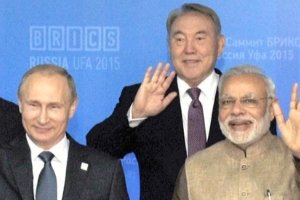TAPI pipeline – is the Iran nuclear deal a threat or an opportunity?
By Rohullah Osmani
September 18th, 2015, The CACI Analyst
After several years of uncertainty, a hope for a breakthrough has emerged for a critical energy project in South-Central Asia. On August 6, 2015, the 22nd TAPI Steering Committee approved Turkmenistan’s Turkmengaz as the consortium leader to oversee efforts in constructing, financing and operating the 1,600 kilometer natural gas pipeline. Achieving this milestone suggests a very important development for TAPI. Turkmenistan is taking a firmer lead in the project after talks with a French investor stalled, and also after the recent agreement over Iran’s nuclear program. This suggests Ashgabat is speeding up the project over fears that Iranian gas might flood back on to the market.
Turkmen state company to lead consortium for TAPI pipeline project
By Tavus Rejepova (09/02/2015 issue of the CACI Analyst)
On August 6, the participants of the 22nd Steering Committee meeting of the Turkmenistan-Afghanistan-Pakistan-India (TAPI) gas pipeline project unanimously agreed in Ashgabat that Turkmenistan’s State Company TurkmenGas will lead the TAPI Ltd. consortium, a pipeline company that will design, build, own and operate the TAPI Pipeline. After the much awaited selection of a possible consortium leader among interested international oil and gas companies, this move paves the way to begin work on the project.
India and the CPEC project: to oppose or not to oppose?
By Sudha Ramachandran (09/02/2015 issue of the CACI Analyst)
By linking Kashgar with Gwadar port through a network of roads and railway lines, the China-Pakistan Economic Corridor (CPEC) project has the potential to inject new life into the region’s economies. While India has expressed strong objections to the CPEC for economic as well as strategic reasons, it could also benefit from the project by opening up an overland route to new markets in Central Asia.
Iran's reentry on gas markets and challenges to TAPI
By Najia Badykova (09/02/2015 issue of the CACI Analyst)
In anticipation of the lifting of sanctions on Iran and the country’s resulting potential to become a major energy player in Eurasia, Tehran, its neighbors, and European countries are evaluating their options. Iran’s eagerness to enter the European and South Asian gas markets will immediately affect the Caspian Sea Basin, already subjected to intense rivalry over pipeline routes, where most prominently Turkmenistan targets the same markets. Iran cannot in the short term supply gas in the quantities needed to diversify European supply, but seeks to secure its participation in the European market by offering its territory for Turkmen gas deliveries to Europe. Iran is much better positioned towards South Asia, where it can export its surplus gas to Pakistan and India leaving Turkmen gas less competitive in those markets.
Was the SCO summit in Ufa a breakthrough?
By Stephen Blank (19/08/2015 issue of the CACI Analyst)
The annual summit of the Shanghai Cooperation Organization took place on July 9-10 in Ufa, and ratified the expansion of membership to include India and Pakistan, and Iran may join in the future. Thus the SCO is well on the way to becoming a venue for the most powerful Inner Asian states to work together and discuss policy issues affecting Central Asia and beyond. But new membership is not likely to make this organization any more effective as a regional security provider. In fact, all the disputes among the major members, including India and Pakistan, might be imported into the SCO’s structure and serve as a brake on the expansion of its capabilities.







